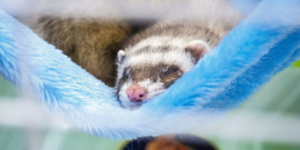FERRETS AS PETS
In recent years, ferrets as pets have become particularly popular across the United States and throughout the world.
These silly, furry little animals make fantastic pets, but it is essential that you are adequately prepared for
ferret ownership and the commitment they take. Here we will discuss 21 essential points that need to be
considered before you adopt or purchase a ferret.
21 Essential Things To Consider Before Buying Ferrets As Pets
1. Ferrets And The Law
On a state level, ferrets as pets are legal in 48 states in the United States. However, some counties and cities in these states have more strict laws in regard to ferret ownership, such as New York City and Dallas, Texas. Make sure to check your cities’ ordinances to ensure ferret ownership is legal in your area. Most areas in which ferrets are legal do require ferrets to be vaccinated regularly against rabies, and many areas also require canine distemper vaccinations as well. Both of these diseases are untreatable and inevitably fatal, so even if it isn’t legally required, it is important for the health of your ferret to vaccinate on a schedule worked out with your veterinarian.
The two states in which ferrets are illegal are California and Hawaii, and are also illegal in Washington D.C. The laws outlawing ferrets in these areas are based on myths about ferrets. In the hundreds of years, since the first ferrets were domesticated, pet ferrets have evolved to have fairly poor eyesight and do not have the necessary instincts to survive in the wild, but many opponents of ferrets believe, inaccurately, that ferrets are more likely to carry rabies, have bad temperaments, or would cause massive damage to local vegetation and wildlife if they were to escape.
It is also important to check with your landlord before taking home a new ferret if you rent an apartment or house, as unauthorized animals per your lease can cost a significant amount of money.
2. Where Will Your Ferrets Live?
Ferrets are hearty creatures, but it is important to maintain proper lodging for them. Ideally, your ferret would reside with you in your home or your apartment, as ferrets as pets shouldn’t be kept in an environment that is too warm or too cool. However, if you live in a moderately temperate climate without extremes and have a well-protected porch or balcony, your ferret may enjoy living (in a cage of course!)
3. Ferrets Need A Secure Cage
When purchasing or adopting a pet ferret, it is important to understand that there are many start up costs when bringing a new friend home. Ferrets need a secure cage that they will not be able to break out of, and will also protect them from other animals in your home when you are not able to keep your eye on them. Many cages cost between $100 to $300, and while this can seem a bit expensive, purchasing a quality cage can last the lifetime of your ferrets. Ferret Nation brand cages are among some of the top cages on the market, and are definitely worth the money. For more cage information and types see Best Ferret Cages.
4. Ferret’s Life Span
Ferrets as pets make exceptional additions to your family, but it is important to realize that ferrets have a fairly long lifespan. Depending on who you ask, the average lifespan of a ferret varies, but is generally accepted as between 5 and 10 years, though it is not unheard of to hear of ferrets living to be 12 or even older! Therefore, it is important that when you are thinking of adopting or purchasing a ferret, you remember that this ferret could be a part of your family for a decade or longer.
5. Ferrets and Other Pets
Ferrets are naturally goofy and curious animals, and have the personality to get along well with other animals, such as cats and dogs. However, it is important to understand that while a ferret might want to be friends with the resident cat or dog in your home, your current pet might not be particularly welcoming to a new ferret. Give plenty of time for simple introductions with limited contact, and never leave your ferret unattended with another animal. Ferrets are tough, but they are fragile, and it wouldn’t take much for a friendly wrestle with a cat or dog to turn tragic.
Many other animals should not be introduced to ferrets, such as rabbits, mice and rats, guinea pigs, and birds. Ferrets as pets may be fairly far removed from their wild cousins, but a ferret’s natural prey drive will kick in around these animals and an unfortunate fight may ensue between two pets. Even if they are “just playing” with the other animals, ferrets play hard, and most other animals would not survive a wrestle with a ferret.
6. Ferrets and Children
Ferrets as pets are incredibly playful and can make fantastic companions for everyone in the family. However, if your family is thinking about adding a ferret into the mix, it is important to talk to your older school-aged children about how to appropriately interact with ferrets. It is also important to train your ferret from a young age not to bite fingers and toes. Ferrets are not appropriate pets for young children, as both parties are fairly fragile but can also accidently harm the other party, so if you have young children in the family, make sure to always closely supervise any time they have together.
7. Ferret’s Temperament
If you have only interacted with ferrets at a pet store, you may be under the incorrect assumption that ferrets are almost always sleeping on top of each other. In reality, ferrets are incredibly entertaining pets who love their humans and always enjoying meeting new people. They are incredibly curious about new toys, and enjoy hoarding their favorite toys around the house.
Ferrets can be mischievous however, and when they are bored, this quality is only enhanced since they are fairly intelligent animals as well. Make sure to always have plenty of toys, tubes, and free time to keep your ferret occupied. Ferrets are also notorious escape artists, so it is important to ferret proof your home to make sure your ferrets aren’t able to get outside or into places in your house that are potentially hazardous.
8. Ferrets and Travel
Traveling with pet ferrets may not be the easiest thing, but it is definitely manageable. Ferrets are very curious, and unless they are sleepy, do not like to be confined to a cage. Make sure to provide toys that are particularly favorites of your ferret to help keep them entertained. Additionally, it is important to provide food and water if you are traveling with your ferret for any period of time. Make sure to invest in spill proof water and food containers, and opt for a hard plastic carrier as opposed to the soft bodied, fabric carriers often marketing specifically for ferrets. Their sharp teeth and claws can quickly make holes in these carriers that quickly render them useless.
Car is the preferred method of travel for ferrets. If you need to travel by plane, it is essential to contact your airline to ensure that they will allow you to keep your ferret in the cabin with you. Do not let your ferret fly in the cargo hold, as the temperatures are not well regulated and you would not be able to get to them quickly if they were to have a medical emergency.
9. How Much Do Ferrets Cost?
One of the biggest things to consider when getting a ferret is if you can afford the cost. How much a ferret will cost depends on where you get them. If you purchase your ferret from a breeder or a pet store, they will range in price anywhere between $150 to $250. Generally, this price will include desexing and their first round of vaccinations. If basic veterinary care is not included in the purchase price, vaccination and surgery may cost up to $200 more. If you adopt a ferret from a humane society or rescue, the price is generally a bit less, usually between $75 and $150.
Beyond their vaccination schedule, ferrest should visit the vet annually for a check up. Ferrets are prone to problems with their pancreas, as well as certain types of cancer. Early detection will help to improve the quality and length of life in your ferret. As ferrets age, these problems tend to be more common, so expect an elderly ferret to cost more in veterinary care and special foods than a young ferret.
Additionally, ferrets require a satisfactory cage. A good cage is going to cost between $100 and $300, depending on the quality and the needs of you and your ferrets. Quality food is another needed supply, which will cost between $20 and $50 per bag, depending on on the quality, brand, and size of bag.
10. Ferrets Require Time
Ferrets sleep a good chunk of their day, but it is essential that they are allowed three to four hours of play time, outside of their cage every day single day. This does not necessarily have to be all in one chunk of time, but make sure to give your ferrets as much supervised time out of their cage as possible. Make sure you or someone in your family are able to provide your ferret with the bare minimum everyday.
11. Ferret Proof Your Home
Ferrets as pets are incredibly smart and curious, and seem to gravitate to the things in your home that are bad for them … and their favorite places are places they are not allowed to go! Get down on your hands and knees and look to see what your ferret sees. Make sure electrical cords are out of their reach or covered in protective cords to prevent your furry friend friend harming themselves as well as your electronics. Ferrets also like to climb, so make sure there is nothing that they can climb up that would lead them to dangerous heights in which they could fall from.
Even the smallest mousehole is potentially an escape route for a ferret, so ensure all holes are covered. We once had a ferret go under our kitchen cupboards through the smallest hole … fortunately we had their favorite food at hand and we were finally able to coax her out!
If there is a room you don’t want your ferrets going, make sure they NEVER see you going into that room. If they know there’s somewhere you can go and they can’t, they become absossed about trying to get ingto that room!
12. Exercise and Entertainment
As discussed above, ferrets as pets need plenty of play time every day. Invest in some quality ferret or cat toys, particularly ones that make noise, that your ferrets enjoy playing with. Balls are also a great way to keep your ferrets occupied. Like cats, ferrets are particularly enamored with boxes and paper bags – the noisier the better! Ferrets also like tubes to run and chase each other through, which can be purchased at pet stores or made from PCP tubes. For more ferret toy ideas.
13. Reduce Ferret Odor With Daily Cleaning
The most common misconception about ferrets as pets is that they are inherently smelly. However, the smell surrounding the ferret enclosures at pet stores are generally many ferrets living together and poor litter box training and cleaning. Clean all of your ferrets litter boxes and cage every day, or twice if you have more than two ferrets in your home. Ferrets can produce a lot of poop in a day, and keeping it clean can certainly reduce the ferret smell in your home.
14. Managing Ferret Odor For No Ferret Smell
In addition to keeping their cage clean, there are a few different things that will help to keep the smell almost nonexistent.
Provide your pet ferrets with the highest quality diet. A high quality food will help to keep your ferret’s waste much less smelly, and cleaning the litter box as much as possible will keep the smell at a minimum.
Do not overbathe your ferrets. Most owners want to bathe them once a month, but this actually strips the ferret of their natural oils, which in turn causes them to produce excessive oils, which in turn makes them smellier. It’s not necessary to bathe your ferrets, but if you feel you must, you could bathe your ferret during their main shedding periods or any time they get into something harmful, sticky, or smelly that requires a bath to remove. Some owners never bathe their ferrets, and their smell and cleanliness is well maintained through a quality diet and good cage cleanliness. For more information check out how to get ride of ferret odor in a room.
15. Ferret Diet
A quality diet for ferrets as pets is essential, particularly one that mimics the diet they would consume in the wild. This ideally consists of high quality ferret kibble, with at least 35% crude protein, 20% crude fat, and no more than 3% crude fiber. It’s also a good idea, if possible, to supplement your ferret’s food with high quality raw meat. If possible, ferrets as pets should also be fed a rotating variety of kibble so they do not imprint on any one type of kibble, in case you need to change one type of food or it suddenly becomes unavailable. Ferret food review table.
16. Training Your Pet Ferret
Ferrets as pets are incredibly eager to please, which makes litter box training them fairly easy. However, ferrets are not perfect, and it is rare for ferrets to use the litter box 100 percent of the time like cats do, so don’t be surprised to find an accident every so often. The best way to litter box train your ferret is put them in their litter box as soon as they wake up, as this is usually the time they need to go. Put a litter box in their cage and as many as needed throughout the rest of your home, particularly in areas that your ferrets have been having accidents in. When your ferrets do use their litter box successfully, praise them and give them a pet. When they have an accident, do not attempt to discipline them, as this generally does not work. Instead, move the feces into the litter box and clean the area that they had an accident thoroughly so they are not tempted to use that area again. Ferrets like to please their owners, and will pick up on what you want quickly. It’s important to do your part and keep placing them in the litter box until they get to that point.
Ferrets bite for a variety of different reasons, for attention, to play, or because they are in pain or are sick. Ferrets may bite because they want to be picked up, or be put down if you are holding them. Watch for signals that a bite may be coming to help avoid it, but if your ferret bites to get down, don’t reinforce this behavior by setting them down right away. Scruffing a biting ferret and saying a strong “NO!” can teach them biting is not acceptable. Using the loud “No” is particularly good, because later on, you can just say “No” without scruffing them, and they tend to comply, since they don’t want to be scruffed. If you don’t want to scruff your ferret, you could also try waiting a few seconds and then set them down. If your ferret bites during play, simply stop and ignore them for a few seconds, again, as to not reinforce bad behavior. Ferrets may also bite if they are in pain or are suddenly blind or deaf may bite out of discomfort or fear, so if biting is out of line with your ferret’s normal behavior, take them to the vet.
You can also train a ferret to come to you. Every time when you want your ferrets to come to you, make the same noise – a squeaky toy works well. As soon as they arrive, have their favorite food ready for them – a treat they love, or raw meat always works well for our ferrets! Initially you might need to gather your ferrets while making this sound, but once they get the idea, they will generally come when they hear the sound. This is very useful for if your ferret gets lost in the house or escapes. You can use the same sound to call them, and, unless they are too far away to hear, or trapped and can’t get out, you will find they will come.
17. Ferrets Underfoot
Ferrets as pets, also known as “carpet sharks” and “rugrats”, love to burrow and tunnel under rugs and blankets around hang around your feet. Be mindful as you walk around your home, and warn visitors prior to them coming over to be mindful of your small, furry friends.
18. Ferrets Prefer Company
Ferrets as pets love their humans and are often friends with cats and dogs in the household, but in order for your ferret to truly thrive, the company of another ferret is key. Ferrets are very social animals, and a companion will keep them occupied during their time in their cage and help keep them entertained when they are out of their cage.
19. Ferret Care
Daily, it is important to provide your ferret with fresh food, fresh water, and clean any litter boxes and their cage. Every week, it is important to completely change out all of the litter in litter boxes and wash them thoroughly. It is also important to clean their cage completely, wash out their food and water containers, and wash their bedding. Every two weeks, check to make sure their ears are free of debris and parasites, as well as clip their toenails. As discussed above, ferrets should visit the vet at least once a year for an overall check up and any booster shots needed. For more ferret care tips check out Best Ferret Care.
20. Handling Your Ferret With Confidence
There is no need to be scared of holding a ferret, as they are affectionate, silly animals. However, it is important to be in a relaxed, confident state of mind while you are handling your ferret, as they are able to sense human emotions. Pick your ferrets up with two hands, with one around their middle right behind their front legs and one hand supporting their butt. Correct handling can help prevent biting in ferrets as pets as well.
21. Are Ferrets Good Lap Pets?
Ferrets as pets are fantastic companions as they are funny, entertaining, and affectionate, but don’t expect your new ferret to curl up in your lap like a cat or dog would. In the wild, ferrets sleep in tunnels and burrows, and that habit is still deeply ingrained. You will often find your ferret sleeping cozily underneath blankets or under couches, and very rarely will you have a ferret curl up on your lap for a nap. This usually only happens if you happen upon them already asleep and they are in a cuddling mood after a long day of playing. Having said that, there are some wonderful wearable products on the market that can mimic a tunnel for a ferret – ferret slings – you can wear one of these, and you may find it bacomes the favorite sleep place when it’s time for your ferrets to nap! Ideal for winter cuddles.
The Best Ferret Start-Up Kit – A Beginner’s Guide to Ferret Supplies
The Best Ferret Start-Up Kit – A Beginner’s Guide to Ferret Supplies
Conclusion
Ferrets as pets are a fantastic addition to your family, but as with any pet, it is important to do your research before bringing one home. This ensures that both you and your ferret are happy and healthy, and ensures that your ferret is able to live a long life as a part of your family.
Related Blogs

Do Ferrets Make Good Pets?
Do Ferrets Make Good Pets? If you haven’t spent a lot of time around ferrets, you might see them romping around at the pet store and wonder “do ferrets make good pets?" Any ferret lover or owner...

Do Ferrets Get Along With Dogs?
Is A Ferret A Good Fit For Your Dog? Chances are if you are a pet owner, it is hard to stop at just one! However, it is always important to keep in mind how your resident animal may react to the new...

Do Ferrets Get Along With Cats?
Will Cats and Ferrets Get Alone? As many pet owners are aware, once you start bringing animals into your home, it can be rather hard to keep yourself from bringing all the animals into your family....


